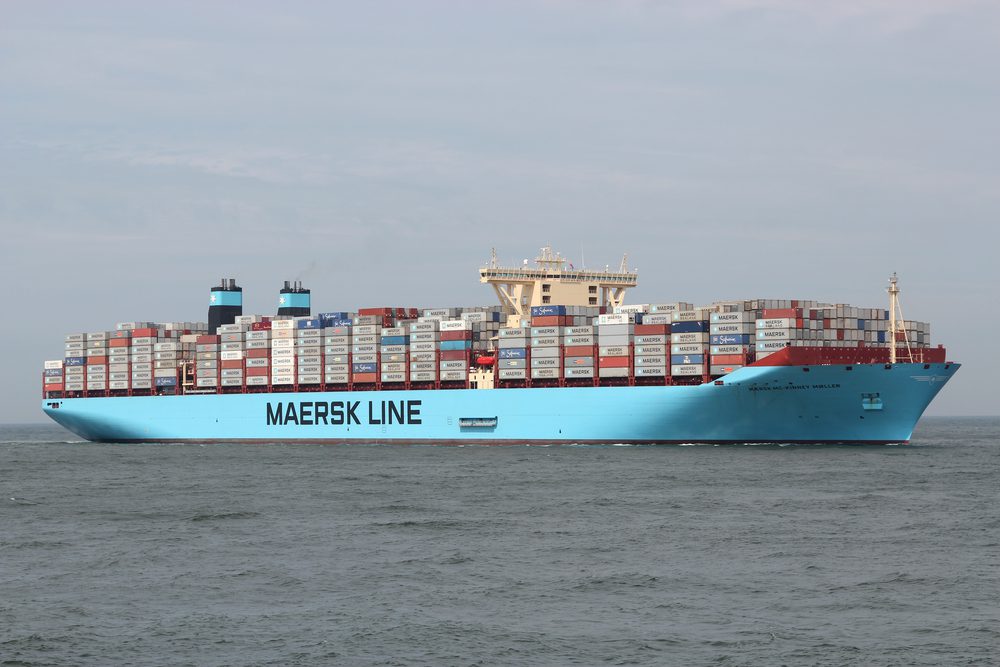Photo: Bjoern Wylezich / Shutterstock.com
 By Aditya Kalra and Aditi Shah NEW DELHI, Nov 20 (Reuters) – India’s antitrust regulator has ordered a probe into alleged anti-competitive practices by Denmark’s A.P. Moller-Maersk and Dubai’s DP World at the terminals they operate at the country’s largest container port in Mumbai, five sources familiar with the matter told Reuters.
By Aditya Kalra and Aditi Shah NEW DELHI, Nov 20 (Reuters) – India’s antitrust regulator has ordered a probe into alleged anti-competitive practices by Denmark’s A.P. Moller-Maersk and Dubai’s DP World at the terminals they operate at the country’s largest container port in Mumbai, five sources familiar with the matter told Reuters.
The decision by the Competition Commission of India (CCI) to investigate follows a complaint by Singapore’s PSA International Pte Ltd, which alleged that Maersk and DP World created entry barriers to hinder the growth of PSA’s terminal by colluding on certain charges they levy at the state-owned Jawaharlal Nehru Port Trust (JNPT).
Handling 66 million tonnes of cargo in the last fiscal year to March, JNPT is critical to India’s international trade. The port handles more than half of India’s traffic of shipping containers each year.
Units of Maersk, DP World and PSA operate four of the port’s five terminals, with the fifth owned by the government. The PSA terminal, inaugurated by Prime Minister Narendra Modi in February, is planned to be the largest, expected to nearly double JNPT’s capacity and help fulfil the government’s vision of boosting India’s economic growth by modernising its ports.
The dispute centres around so-called inter-terminal transfers.
Under the system, which aims to make the most efficient use of common infrastructure, freight trains arriving at JNPT typically carry containers destined for several terminals, but stop at just one that handles all the cargo on a given day. Other operators then collect their containers by truck for loading at their own terminals. A similar procedure is followed, in reverse, when imported containers are unloaded.
In June, PSA, which is owned by Singapore government-owned investment fund Temasek Holdings, lodged a complaint with the CCI alleging it was facing discrimination because Maersk and DP World were imposing a higher fee on shipping companies for handling containers that arrived at the PSA terminal, the sources said.
In an order passed on Nov. 9, the CCI said its preliminary probe found that Maersk and DP World had coordinated their efforts to prevent PSA from operating effectively at the Mumbai port, said two of the sources who have direct knowledge of the case.
A.P. Moller-Maersk, the world’s biggest container shipping group, told Reuters that CCI was hearing a case brought forward by PSA, but said it would not comment as the matter was sub judice.
DP World said it had not received any formal communication from the CCI, but added it has “always been committed to ensuring our business meets the highest standards, complying with all laws and regulations”.
PSA International did not respond to a request for comment. JNPT and the CCI did not respond to Reuters’ questions.
COORDINATED CONDUCT
The CCI’s decision to order a probe and details of PSA’s allegations have not been previously reported.
“This co-ordinated conduct on the part of the opposite parties (Maersk and DP World units) prima facie hints at creating entry barriers for the informant (PSA),” the CCI said, according to one of the sources privy to the order.
The regulator asked its investigations unit to further probe the allegations and submit a report by January. The probe would also look at the role of individual company executives, the sources said. Such investigations, however, typically extend beyond a year.
JNPT, which began its operations in 1989, is ranked among the world’s top 50 container ports. It plays a key role in Modi’s plan to develop India’s coastline and maritime sector.
In its complaint, parts of which were reviewed by Reuters, PSA alleged that Maersk and DP World had issued advisories to deter use of the PSA terminal, telling port users they would need to make their own arrangements to transfer their cargo if it was dropped at the PSA dock.
One of the sources who is privy to the Indian watchdog’s order said the CCI found the coordinated conduct by Maersk and DP World had the potential to bring about an anti-competitive effect.
Another source privy to the proceedings, though, disagreed, saying the dispute was only a commercial one and not a competition law matter as alleged by PSA.
The complaint was filed by PSA’s Indian unit Bharat Mumbai Container Terminals. The opposing parties in the case are Maersk’s unit Gateway Terminals India, and DP World’s Nhava Sheva International Container Terminal and Nhava Sheva (India) Gateway Terminal. (Reporting by Aditya Kalra and Aditi Shah in New Delhi; Editing by Martin Howell and Alex Richardson)
(c) Copyright Thomson Reuters 2018.

 Join The Club
Join The Club











